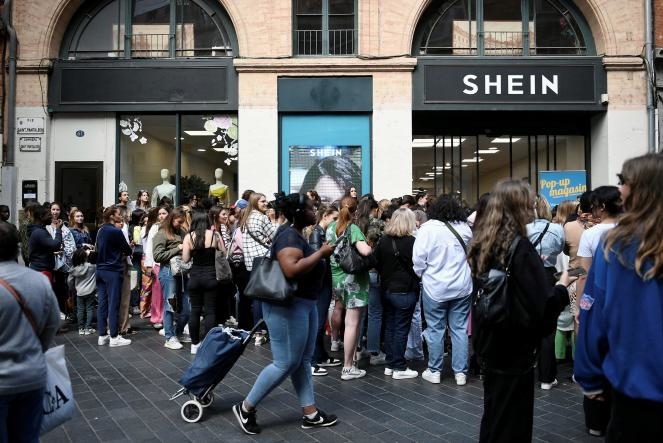As Shein (China) increasingly penetrates Europe, it worries its competitors and those interested in the eurozone fashion industry, according to Le Monde.
Chinese online fashion retailer Shein opened a store in the Marais, central Paris, on May 5. A pop-up, it will only be open for four days, until May 8. But this is not the first time Shein has opened a pop-up store in France. It opened in Toulouse and Montpellier a year ago and in Lyon in March. “Eight thousand people came,” a company spokesperson said.
This time around, the store offers cocktails and DJs. Customers can also watch performances, join in the dancing and enjoy pink pastries from Besties Bakery.
Fans flocked to the event, forming long lines outside. The bustling atmosphere at the store over the past few days was broadcast on TikTok, with TikTokers flipping through product prices on camera and shouting, “Wow, that’s cheap!”

Customers line up in front of Shein's pop-up store in Toulouse, France on May 25, 2022. Photo: MAXPPP
Shein’s media blitz has irked Yann Rivoallan, president of the French Federation of Women’s Ready-to-Wear (FFPPF), who says Shein has become a major player in the industry by selling tank tops for €10.99 and trousers for €8.99, using quick fashion and aggressive marketing.
Aiming to attract young Generation Z women – those born between 1995 and 2010 – Shein regularly opens pop-up stores around the world to promote its online fashion platform.
In the Philippines, the company opened a store in Makati, a suburb of Manila, for a few days in April. In late March, a Shein pop-up store in Toronto, Canada, attracted 5,500 people in a single weekend. In Japan, the brand’s bags have also become popular with Tokyoites since opening a showroom in the Harajuku district late last year.
Cheap fashion business is in season
Shein's founder is Chris Xu, also known as Xu Yangtian. After creating an online store in 2008 in Nanjing with two partners, Wang Xiaohu and Li Peng, Xu launched a wedding dress website under the name Sheinside.
Xu then diversified the business into casual wear for women, children and men. In 2015, he shortened the name to Shein. Two years later, Xu moved the company 1,500 kilometers from its birthplace to Guangzhou—a major textile hub—and began selling items online with on-demand manufacturing. Shein’s subcontractors use the company’s software to “be more agile and responsive to demand.”
The online fashion startup exploded in 2020, when Covid-19 and lockdowns around the world were a boon for e-commerce. Smartphones became the go-to shopping platform, and Shein’s app was on track. Revenues hit €8.8 billion in 2020, rising to €16 billion a year later and €30 billion in 2022. That puts Shein almost as profitable as Inditex, the group that owns Zara, which made €32.6 billion last year.
According to the Financial Times , Shein's revenue could reach 53 billion euros by 2025. In the US, Shein has a market share of about 50% in the fast fashion sector pioneered by Zara, H&M, Forever 21 and Asos. They are poised to grow further in North America after opening two warehouses in Whitestown (USA) and Toronto (Canada) by the end of 2022.
Shein is also expanding its presence in Europe at a good time, because “low-cost consumption is no longer a shame,” according to Flavien Neuvy, director of consumer research firm Cetelem Observatory.
In the 1990s, budget retail was seen as something only “people who couldn’t afford” higher quality goods. That’s no longer the case, whether it’s buying a plane ticket from EasyJet, shopping at budget grocery chains like Lidl or buying online.
Neuvy believes that the current inflationary climate is a breeding ground for low-cost retailers, including Shein. Environmentalists are largely unhappy with Shein for the environmental impact of its polyester clothing and its marketing strategy of encouraging overconsumption.
Shein is now available in 150 countries. According to Bloomberg , an April 2022 funding round from Sequoia Capital China, IDG Capital and Tiger Global Management valued the company at $100 billion. In March, Reuters reported that Shein was valued at $64 billion. A second $2 billion funding round is underway and the company is planning a Wall Street listing in the second half of this year. This could further enrich Chris Xu, whose net worth is estimated at $10.5 billion, according to Forbes .
European organizations and businesses are skeptical.
Several social and environmental organizations in Europe have accused Shein of questionable practices. In Germany, Greenpeace analyzed 42 garments purchased across Austria, Germany, Italy, Switzerland and Spain and said 15% of them violated European chemical laws.
In Toulouse, Extinction Rebellion protested outside a Shein pop-up store to remind people how polluting the clothing store is. In the UK, in October 2022, Channel 4 aired a documentary about the 12-hour working conditions of Shein subcontractors.
Some European elected officials have also raised concerns about the working conditions of workers who produce products for Shein. Raphaël Glucksmann, a member of the European Parliament, has repeatedly condemned “everything that Shein is hiding.”
The French government has also vowed to be vigilant. This is all the more important, Rivoallan said, considering that the industry is going through a serious social crisis. The FFPPF president said that employees of Kookaï, Pimkie and other French brands are being threatened by Shein's "unfair" expansion. "There is still time to stop this infernal machine," said Yohann Petiot, director general of the professional retail organization Alliance du Commerce.
But can Shein be stopped? In the 1990s, major airlines hoped to thwart low-cost carriers by mocking the unreliability of their rivals’ aircraft. They failed. Likewise, to counter Shein, French manufacturers are taking a similar path.
Late last year, the FFPPF took some Shein garments to the French Textile Institute (IFTH) for analysis, hoping to find violations of Europe's REACH regulation on the use of hazardous chemicals. So far, that effort has been in vain.
More samples were sent to the IFTH lab in the spring. The Alliance du Commerce is lobbying to investigate Shein's marketing practices, claiming that the platform is not complying with "price display laws" and is selling items that are falsely labeled as being made of leather or wool. France's Directorate General for Competition, Consumer Affairs and Fraud Control (DGCCRF) has also taken notice.
French fashion experts are still hoping to see Shein banned from the world’s fashion capital. Or at least a similar decision to Wish’s restrictions. After being accused by the DGCCRF of serious product safety violations, the all-inclusive e-commerce site is facing sanctions that will, in theory, mean it will be banned from search engines starting in 2021.
Denying doubts about working conditions, Donald Tang, Vice President of Shein, also affirmed that the company only produces to order, audits subcontractors and requires the use of solar or renewable energy to reduce CO2 emissions by 30% by 2030.
This year, Donald Tang has been actively attending major events such as the World Economic Forum in Davos, Switzerland on January 16. Last month, he was in Barcelona, Spain, to attend the World Retail Congress to reassure skeptics about social and environmental responsibility.
But few Shein customers are paying attention to issues that concern European businesses and professionals. Marie Nguyen, founder of the website WeDressFair, which provides a directory of environmentally responsible brands, noticed this in March, when Shein opened a pop-up store in Lyon. “Most of them (customers) are there to buy as many clothes as they can for 50 euros,” she said.
Marie Nguyen believes the government should respond in two ways: to limit the growth of models like Shein and to educate French women to consume less. According to Refashion, an environmental organization for the French textile industry, sales of clothing and textiles reached nearly 3.3 billion euros last year, a record thanks to low prices.
Phien An ( according to Le Monde )
Source link



































































































Comment (0)